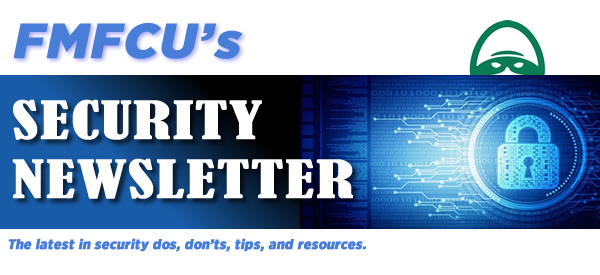
Beware of the Latest Scams
Money Mule Scams
Scammers may try to use you to move stolen money. If you help them, you could be what law enforcement calls a money mule. Scammers send money to you, sometimes by check, then ask you to send some of it to someone else. They often want you to purchase gift cards to mail back or wire transfer funds to another account. Of course, they don’t say the money is stolen and they’re lying about the reason to send it. There never was a relationship, job, or prize. Only a scam.
COVID-19 Unemployment Compensation Scams
The scammers behind the Pandemic Unemployment Assistance (PUA) fraud appear to be using Social Security numbers and other personally identifiable information to apply for and receive PUA benefits. In many situations, the victims are unaware their personal information has been compromised. Protect yourself by :
- Never provide your personal information over email or text message
- Don’t open, respond to or click links contained within unsolicited emails or text messages
- Don’t wire money for strangers, and always ignore the following requests:
- Communications related to your Unemployment Compensation benefits from strangers asking for money;
- Someone who says they can help you file or get you more for your Unemployment Compensation benefits and charging a fee, and
- Anyone claiming to work for Labor & Industry who says they need a fee to complete your application
Romance Scams
Lately, more consumers are getting caught in romance scams. People are getting lured into talking to people with phony online profiles, and once a relationship is established, they pull on heartstrings asking for money for medical emergencies or another grave situation like asking for help to purchase tickets back home from abroad. And now, they’re not only using dating apps but social media as well. Here’s a few tips to spot scammers:
- Never send money or gifts to someone you haven’t met in person. These are professionals who are very convincing.
- Talk to someone you trust about this new relationship. Sometimes, we can be blinded to things that don’t add up because it’s new. Pay attention if your friends or family are concerned.
- Take it slowly. Ask questions and look for inconsistent answers. Try a reverse-image search of profile pictures. If they’re associated with another name or with details that on’t match up, it’s a scam.
Never, Ever Give Out Your Online Banking Credentials to Anyone
FMFCU’s Top Three Don’ts:
- DON’T give out your Online/Mobile Banking Secure Access Codes to anyone, EVER!
- DON’T respond to phone calls, or reply to (including links) texts or emails requesting your PIN, account number, member number, secure access codes, or debit or credit card number.
- DON’T reply to texts attempting to verify debit card transactions. Look at them closely — many are fake! If you do respond to the text, you will receive a call with someone posing as an FMFCU or other financial institution emloyee asking for your online banking credentials, including your SAC code.
Get additional security information in FMFCU’s Security Center.

Leave a Reply